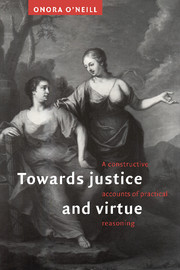Book contents
- Frontmatter
- Contents
- Preface
- Introduction
- 1 Overview: justice against virtue?
- 2 Practical reason: abstraction and construction
- 3 Focus: action, intelligibility and principles
- 4 Scope: agents and subjects: who counts?
- 5 Structure: obligations and rights
- 6 Content I: principles for all: towards justice
- 7 Content II: principles for all: towards virtue
- Bibliography
- Index
5 - Structure: obligations and rights
Published online by Cambridge University Press: 05 June 2012
- Frontmatter
- Contents
- Preface
- Introduction
- 1 Overview: justice against virtue?
- 2 Practical reason: abstraction and construction
- 3 Focus: action, intelligibility and principles
- 4 Scope: agents and subjects: who counts?
- 5 Structure: obligations and rights
- 6 Content I: principles for all: towards justice
- 7 Content II: principles for all: towards virtue
- Bibliography
- Index
Summary
Justice and virtue may both be principled; their significant domains of ethical consideration may both be identifiable for practical purposes: yet they may offer incompatible orientations to life. So far nothing has been shown about the structure, the content or the compatibility of principles of justice or of virtue. All that has been shown is that some popular arguments for their incompatibility and against principle-based accounts of ethics are unconvincing, and that the domain of ethical consideration relevant for activity of all sorts – for individual action, for taking up attitudes, for supporting policies – can be fixed by constructive procedures which do not assume unavailable starting points.
An account of the content of justice and virtue can be helped by preliminary consideration of some structural differences between types of universal principle. Accounts both of the structure and of the content of justice and of virtue will be built upon those of practical reason, of principles and of the scope of ethical consideration. So it is as well to take stock of the materials that are available.
The assembly of materials and methods began by discussing and challenging the common, but unclear, view that justice is abstract and universal, while virtue responds to particularities. Abstraction, taken strictly, emerged as a feature of all reasoning, hence of all practical reasoning, and indeed of all thought and language, so not something that discussions of virtue can or do avoid. While many friends of the virtues legitimately attack reliance on idealized conceptions of agency or rationality, which they detect in the assumptions underlying certain theories of justice, they are mistaken in arguing that this defect provides either reason for or the possibility of rejecting abstraction.
- Type
- Chapter
- Information
- Towards Justice and VirtueA Constructive Account of Practical Reasoning, pp. 122 - 153Publisher: Cambridge University PressPrint publication year: 1996



